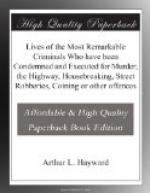Many without knowing the Law have taken occasion to be very free with its precedents, and to treat them as things written in barbarous Latin, in which an unreasonable, if not ridiculous nicety is sometimes required. But when this comes to be thoroughly examined, we shall find that their proceedings are exactly conformable to reason, for if care and circumspection be necessary in deeds and writings relating to civil affairs, ought it not a fortiori to be more so where the life, liberty, reputation and everything that is dear and valuable to the subject is at stake? Therefore, since there are technical words in all sciences, surely the Law is not to be blamed for preserving certain words to which they have affixed particular and determined meanings for the expressing of such crimes as are made more or less culpable by the Legislature. Thus Murdravit is absolutely necessary in an indictment charging the prisoner with a murder; Caepit is the term made use of in indictments of larceny. Mayhemaivit expresses the fact charged in an indictment of maim; Felonice is absolutely necessary in all indictments of felony of what kind soever; Burglariter is the Latin word made use of to express that breaking which from particular circumstances our Law has called burglary, and appointed certain punishment for those who are guilty thereof. Proditorie expresses the Act in indictments of treason, and even if these are not Latin words, justified by the usage of Roman authors, the certainty which they give to those charges in which they are used, and which could not be so well expressed by circumlocutions, is a full answer to that objection, since the proceedings before a Court aim not at elegancy, but at Justice. But let us now go on to the next step taken to bring the offenders to Judgment.
The bill having been found by the grand jury, the prisoner is brought into the Court where he is to be tried, and set to the bar in the presence of the judges who are to try him. Then he is usually commanded to hold up his hand, but this being only a ceremony to make the person known to the court it may be omitted, or the person indicted saying I am here, will answer the same end. Then the proper officer reads the indictment which has been found against him, in English, and when he hath so done, he demands of the prisoner whether he be guilty or not guilty of the fact alleged against him, to which the prisoner answers as he thinks fit, and this answer is styled his plea. That tenderness which the English Law on all occasions expresses towards those who are to be brought to answer for crimes alleged against them, requires that at his arraignment, the prisoner be totally free from any pain or duress which may disturb his thought and hinder his liberty of pleading as he thinks fit, and for this reason, even in cases of high treason, irons are taken off during the time the prisoner is at the bar, where he stands without any marks of contumely whatsoever.




